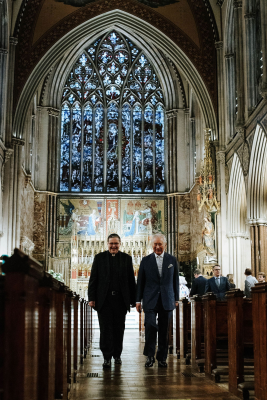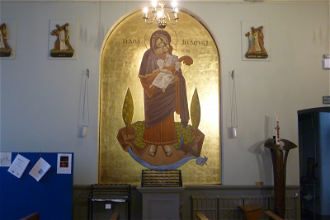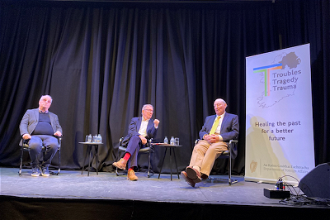Homily text: Fr Dominic Robinson - Sunday 6 February 2022

Fr Robinson with Prince of Wales during Farm Street Church visit
If you visit this part of London regularly, or even if you don't and maybe have lived in our city for years, maybe you might have walked through St James's, not very far from here, and passed St James's Palace, still very much a royal residence, and a landmark on the tourist maps. But I wonder if you're aware that in the second half of the 17th century there was a Jesuit priest resident there, ministering as personal chaplain to the then Duchess of York, Mary of Modena, later to become Queen of England during the restoration of the Catholic monarchy under King James II. I mention this because it's his feast day coming up soon on February 15th - St Claude la Colombière - a Jesuit saint - if you like a special patron of Farm Street - but also because it seems fitting to make this connection on this very special weekend on which we celebrate with great gratitude 70 years on the throne of Her Majesty The Queen, and also following a week when we were honoured ourselves with a first ever official visit from The Prince of Wales to our Parish and church to see our icon exhibition 'Metamorphosis' and meet especially our homeless guests and our volunteers from across central London Catholic churches who have worked so tirelessly for the rough sleeping community during the pandemic. All this reminded me of how far we have come in so many ways which speak of united service and the desire for reconciliation.
St Claude's role was fraught with difficulties because of the anti-Catholic sentiments that prevailed in England at the time in a century which was still reeling from the Gunpowder Plot. After just three years in post, at the end of 1678, Fr de la Colombière was wrongly accused and arrested in connection with the so-called Titus Oates Plot, in which Catholics were implicated in treason against the crown. Six Jesuits also implicated were executed in fact and are buried in St Giles' Churchyard near Tottenham Court Road. After two days of interrogation, he was transferred to the severe King's Bench Prison where he remained for three weeks in extremely poor conditions until he was finally expelled from England by royal decree. Colombière survived where many didn't - we have our fair share of martyrs - but I think what he stands for, although it didn't lead to martyrdom, nevertheless is worth remembering him for.
In serving the government of the time, he was serving God first - a perilous task in the England of the time, which surely required him to meditate regularly on conscience in balancing his commitment to do his job and to his faith. Whereas he could have gone for an easier life and used his position to ingratiate himself with the establishment, he gave himself tirelessly in his time in London to promoting the Catholic faith and serving his flock through tireless pastoral work for Catholics in this neighbourhood. And through these acts of kindness he was able to win many friends and allies, to build bridges which have lasting significance to how as the Catholic community we are able to act freely and take our proper place within a multicultural, multireligious society. The primacy of conscience over expediency for an easy life has lasting results.
"Here I am Lord". Hearing the readings the Church gives us this weekend reminds us that to sign up to follow Christ is never a simple business. It's complex and requires discernment, courage, duty and responsibility. To commit ourselves to follow him is to learn how the disciple in his or her own way may well embrace the cross. This is the key theme in St Paul's letters. Trust in God who gives us the strength when standing up for Christian values is tough, compromises our lifestyle and career path. It is only God to whom ultimately we can turn. He has been through it. His heart was pierced for us. "The only thing I can boast about is the cross of Jesus" - it is his marks I bear, not my own.
The readings today remind us that to be a disciple is a gift from God which involves the cross as our strength; and it is a journey we make through life; a journey which we set out on when we here his call on the lakeshore and see the lavish fruit of the Lord's power - the power to burst the nets with the catch of fish. But for Peter this is but the start. He will know only too well what he glimpses now, that rather than work out according to his own designs how to catch fish, how to sow up the nets and work out the perfect plan for livelihood and progress, he will be taken where he would rather not go, and rely on the Lord working through him to give him strength to live out the life of the Christian. The disciple will only bring the peace that the world cannot give to others when they are prepared to give themselves over to him, as only this brings true inner peace.
When we don't give in to complacency, of satisfaction just with doing the minimum, of making sure not to rock the boat but recognize in my call as St Peter says, that "Lord, I am a sinful man" - that all in fact is grace, as St Paul says in another place, "the grace that he gave me has not been fruitless. Not I - but the grace of God that is with me - has given me the power to work and to preach".
Today's Gospel does suggest to us ways of beginning to think again of the Lord's call for each one of us. In particular it invites us to enter more deeply into the relationship with Christ those first disciples had and ask ourselves where that bites, where it costs. Can we ponder our relationship with Christ, spending time pondering his cross - as St Paul did so in so many of his letters. And here in the Mass seeing and knowing what He has done for us - the sacrifice for the salvation of all here nourished in Christ's Liturgy, our praise of him on the earth - nourished together by Christ's presence in the Word we have heard and shortly, above all, in the Eucharist - Christ's Body and Blood - we will receive - the reality of his saving presence among us.
And so that invites us to join with him on his mission in the midst of the world - especially when perhaps the values and the ways of the world - in our relationships, our professional lives, our daily living, test us to lay ourselves open to being victimised or discriminated against. How are we men and women whose lives are informed with the mission to be, as Christ was, for others. To stand up for Christ's teachings where there is injustice, discrimination, and the compromising of conscience and the common good.
What more is Christ asking of me? "Here I am Lord". How will I respond to the call to be sent out into deeper waters still as a disciple in our world of today? Only trusting in him, who leads us and guides us.
The Metamorphosis exhibition is open to the public until Wednesday, 9 February from 8am to 8pm.
Icon artist Irina Bradley will be giving her lecture: 'Symbolism of Colour in Icon Painting' on Monday 7 February at 6.45pm.
Tickets can be purchased here: www.eventbrite.co.uk/e/the-symbolism-of-colour-in-icon-painting-tickets-247129881127


















